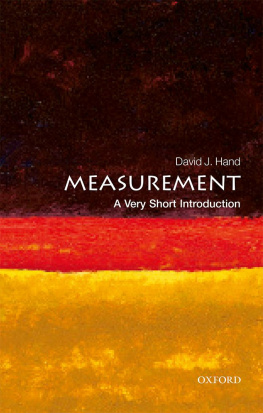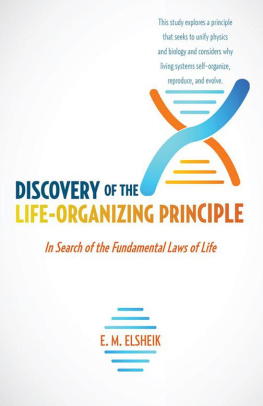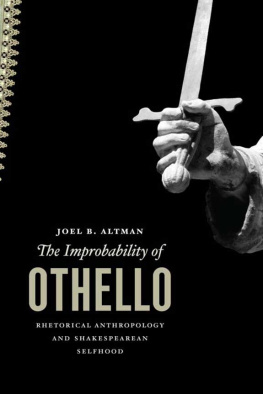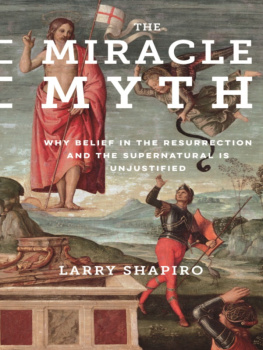
The author and publisher have provided this e-book to you for your personal use only. You may not make this e-book publicly available in any way. Copyright infringement is against the law. If you believe the copy of this e-book you are reading infringes on the authors copyright, please notify the publisher at: us.macmillanusa.com/piracy.
For Shelley
The really unusual day would be one where nothing unusual happens.
Persi Diaconis
Contents
Preface
This book is about extraordinarily improbable events. Its about why incredibly unlikely things happen. But more: its about why they just keep on happening, time after time after time.
At first glance, this seems like a contradiction. How can events be incredibly unlikely and yet keep on happening? Unlikely surely means rare.
The fact that it isnt a contradiction is suggested by many real-life examples: people winning lotteries multiple times, lightning repeatedly striking the same unfortunate man, extreme financial crashes occurring again and again, and so on. But it certainly needs explaining.
The universe has laws which describe the way it works. Newtons laws of motion tell us how dropped objects fall and why the moon orbits the earth. They explain why a car seat presses into your back when you accelerate, and why the ground hits you so hard when you trip and fall. Other laws of nature show us how stars are born and how stars die, where humanity comes from, and perhaps where its going.
The same applies to exceedingly unlikely events. The Improbability Principle is my name for a set of laws of chance which, together, tell us that we should expect the unexpected, and why.
The laws composing the principle arise at several levels. Some refer to fundamental aspects of the way the universe is constructedas fundamental as the basic, abstract truth that two plus two equals four. Others hinge on deep properties of what we mean by probability. And yet others arise at the level of human psychology: the brain is not a simple recording device. In the right circumstances, any one of the laws is sufficient to lead to an instance of the principle, but its when they come together and work in unison that the force of the principle becomes really striking. And the inconceivably unlikely happens.
Books like this one are built on research, conversations, and discussions with many people over many yearsfar too many to acknowledge properly. But some were especially helpful in seeing the ideas through the final stages to becoming a book. My friends and colleagues Mike Crowe, Kate Land, Niall Adams, Nick Heard, and Christoforos Anagnostopoulos kindly gave me comments on various drafts. My agent, Peter Tallack, and my editor, Amanda Moon, played critical roles in the journey from rough draft to finished product. Coincidentally (or perhaps not, since coincidences are one manifestation of the Improbability Principle), while the book was still at the conceptual stage, David Harding, founder of Winton Capital Management, approached me about a role in his company. The deep inferential challenges I encountered there encouraged me to think more deeply about rare events. And finally, I am most grateful to my wife, Shelley, for tolerating, yet again, my spiritual absences as the book gradually took shape, as well as for making invaluable comments on its content.
THE MYSTERY
Fortune brings in some boats that are not steerd.
William Shakespeare
Simply Unbelievable
In the summer of 1972, the actor Anthony Hopkins was signed to play a leading role in a film based on George Feifers novel The Girl from Petrovka , so he traveled to London to buy a copy of the book. Unfortunately, none of the main London bookstores had a copy. Then, on his way home, waiting for an underground train at Leicester Square tube station, he saw a discarded book lying on the seat next to him. It was a copy of The Girl from Petrovka .
As if that was not coincidence enough, more was to follow. Later, when he had a chance to meet the author, Hopkins told him about this strange occurrence. Feifer was interested. He said that in November 1971 he had lent a friend a copy of the booka uniquely annotated copy in which he had made notes on turning the British English into American English (labour to labor, and so on) for the publication of an American versionbut his friend had lost the copy in Bayswater, London. A quick check of the annotations in the copy Hopkins had found showed that it was the very same copy that Feifers friend had mislaid.
You have to ask: Whats the chance of that happening? One in a million? One in a billion? Either way, it begins to stretch the bounds of credibility. It hints at an explanation in terms of forces and influences of which we are unaware, bringing the book back in a circle to Hopkins and then to Feifer.
Heres another striking incident, this time from the book Synchronicity , by the psychoanalyst Carl Jung. He writes: The writer Wilhelm von Scholz tells the story of a mother who took a photograph of her small son in the Black Forest. She left the film to be developed in Strassburg. But, owing to the outbreak of war, she was unable to fetch it and gave it up for lost. In 1916 she bought a film in Frankfurt in order to take a photograph of her daughter, who had been born in the meantime. When the film was developed, it was found to be doubly exposed: the picture underneath was the photograph she had taken of her son in 1914! The old film had not been developed and had somehow got into circulation again among the new films.
Most of us will have experienced coincidences rather like theseif not quite so extraordinary. They might be more akin to thinking of someone just before she phones you. Strangely enough, while I was writing part of this book, I had precisely this sort of experience. A colleague at work asked me if I could recommend some publications on a specific aspect of statistical methodology (the so-called multivariate t-distribution). The next day, I did a little research and managed to identify a book on exactly that topic by two statisticians, Samuel Kotz and Saralees Nadarajah. I had started to type an e-mail to my colleague, giving him the details of this book, when I was interrupted by a phone call from Canada. During the conversation, the caller happened to mention that Samuel Kotz had just died.
And so it goes on. On September 28, 2005, The Telegraph described how a golfer, Joan Cresswell, scored a hole in one with a fifty-yard shot at the thirteenth hole at the Barrow Golf Club in Cumbria in the UK. Surprising, you may think, but not outlandishly soafter all, holes in one do happen. But what if I tell you that, immediately afterward, a fellow golfer, the novice Margaret Williams, also scored a hole in one?
Theres no getting away from it: sometimes events occur which seem so improbable, so unexpected, and so unlikely, they hint that theres something about the universe we dont understand. They make us wonder if the familiar laws of nature and causality, through which we run our everyday lives, occasionally break down. They certainly make us doubt that they can be explained by the accidental confluence of events, by the random throwing together of people and things. They almost suggest that something is exerting an invisible influence.
Often such occurrences merely startle us, and give us stories to tell. On my first trip to New Zealand, I settled down in a caf, and noticed that the notepaper being used by one of the two strangers at the neighboring table was from my own university back in the UK. But at other times, these uncanny events can significantly alter livesfor the better, as with a New Jersey woman who won the lottery twice, or for the worse, as with Major Summerford, who was struck by lightning several times.
Next page











